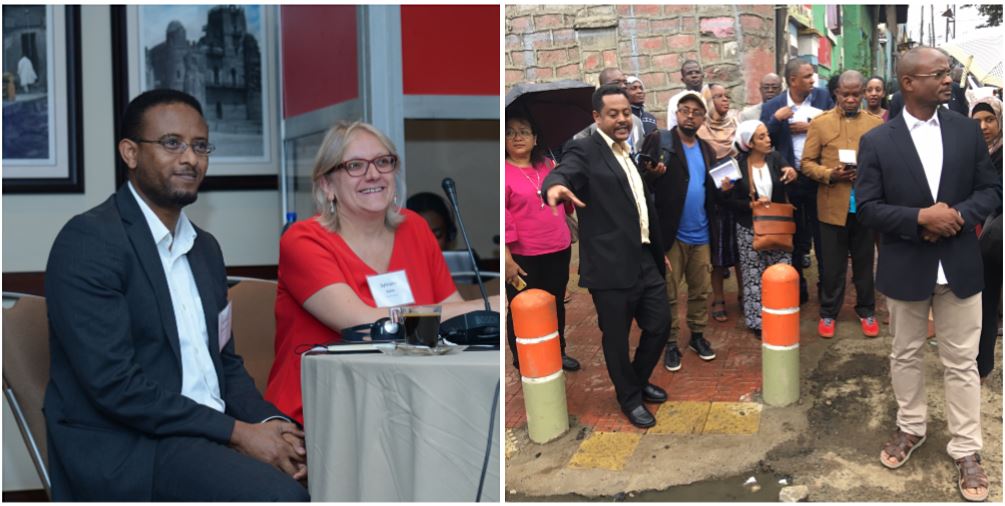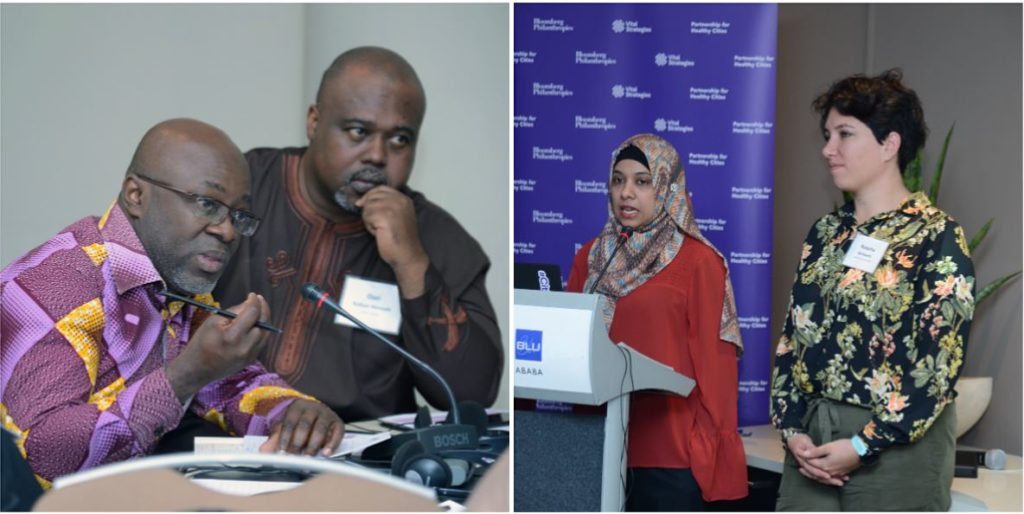Ten African cities joined public health experts in Addis Ababa, Ethiopia last month to highlight remarkable success stories about preventing noncommunicable diseases (NCDs) and road injuries—and to learn from regional experts and from each other.
Stories ranged from Ouagadougou, Burkina Faso’s creation of the city’s first-ever nutritional guidelines to Kampala, Uganda’s steps toward becoming a smoke-free city and Lusaka, Zambia’s reconstruction of two school zones after a spate of deadly crashes.
The three-day workshop was part of the Partnership for Healthy Cities, a two-year-old global network of cities committed to preventing NCDs and road injuries that is funded by Bloomberg Philanthropies, with the World Health Organization and Vital Strategies as implementing partners. Participants benefitted from a series of trainings on tobacco control, road safety and communications, as well as round-the-clock networking opportunities.
Addis Ababa Deputy Mayor Dr. Solomon Kidane welcomed participants and grounded the event in local context. The city has emerged as a leader in making streets safer for pedestrians, cyclists, motorcyclists and other road users, in a region that accounts for the highest rate of road traffic deaths in the world.
Addressing the challenge head-on, Addis Ababa’s Partnership-supported “Establish a Safe Neighborhood Program” aims to protect pedestrians by reducing vehicle speeds and improving infrastructure. Workshop participants got a first-hand view of this work in a site visit to Menelik Square, where pole-mounted speed radars have been installed to enforce the neighborhood speed limit.
Here are some highlights from the workshop:
Road Safety First

On the first day of the workshop,Deputy Mayor Dr. Kidane, a longtime road safety advocate, joined Sylviane Ratte, Director of Vital Strategies’ Road Safety Program, to discuss best practices and strategies for success for ending preventable deaths on the road. In the afternoon, Daniel Molla, BIGRS Coordinator in Addis Ababa, guided workshop participants through a tour of road safety improvements in the Menelik Square area supported by the Partnership and the Bloomberg Initiative for Road Safety (BIGRS).
Big Successes Around the Continent

Desmond Appiah and Osei Kufuor-Mensah of the Accra Metropolitan Assembly described a major highway transformation underway as part of their Partnership work. The Lapaz intersection, crossing an eight-lane highway, claims the highest rate of road crashes and fatalities in Accra. A series of infrastructure changes have led to an estimated 70% decrease in road crashes since 2017, including: increasing the amount of time on traffic signals to give pedestrians more time to cross; widening the median at the center of the road to give residents, and especially those with disabilities, a safe place to break up their crossing; adding road markings and barriers which indicate safe places to cross the road; and reducing the size of lanes to encourage slower driving speeds.
Dr. Waarisa Fareed and Dr. Natacha Berkowitz worked to curb the consumption of sugary drinks in Cape Town, a city where diabetes is one of the leading causes of death. A multi-pronged approach has already produced some initial successes. A change in perceptions on sugary drinks is an early result of a mass media campaign paired with community education embedded in a holistic “Live Well” challenge. On the policy side, a government tax on and the removal of sugary drinks from government buildings served to decrease demand.
Next Steps

The city of Ouagadougou, Burkina Faso is also taking on sugary drinks. After developing city-wide recommendations for sugar and salt consumption, and hygiene guidelines for schools, hospitals, and restaurants, the next step will be focused on education and training for residents across the city. Ouagadougou’s technical lead Rigobert Martial Tiendrebeogo described a forthcoming communication campaign to raise awareness among residents of the dangers of sugary drinks and encourage them to choose healthier options.
To combat high tobacco use in Kampala, Uganda, the city has developed an enforcement protocol to strengthen compliance with a strong national smoke-free law. Stakeholders from across the city responded to a bold communications and outreach campaign designed to increase awareness of the harms of smoking and of public policy in place. At the Addis Ababa workshop, Angela Nshimye, Environmental Officer at the Kampala Capital City Authority, presented results from a social media campaign that will continue to complement enforcement efforts.
About the Partnership for Healthy Cities
The Partnership for Healthy Cities is a prestigious global network of cities committed to saving lives by preventing noncommunicable diseases (NCDs) and injuries. Supported by Bloomberg Philanthropies in partnership with WHO, as well as Vital Strategies, this initiative enables cities around the world to deliver a high-impact policy or programmatic intervention to reduce NCD risk factors in their communities. For more information, visit: https://partnershipforhealthycities.bloomberg.org/